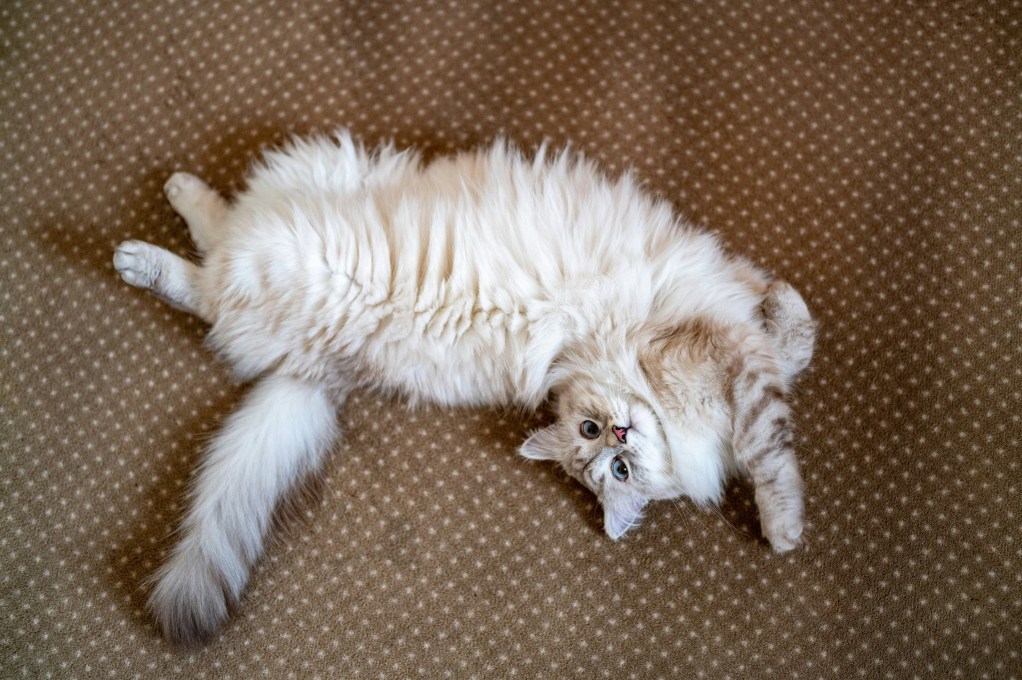
Every cat owner has gone to pet their fur baby, only to get swatted in the face by their kitty. Sometimes, it can seem like cats don’t enjoy affection at all. But while these finicky animals might prefer you pet them only on their terms, most cats do want pats from time to time, in the right places, of course. So why do cats like being pet? We’ll walk you through where, how, and why to pet your four-legged feline friend.
Why do cats like being pet?

Like so many things, you need to understand their basic nature to have a better sense of why they yearn for your attention. Even in the wild, you might see cats groom and snuggle together, which has evolved into head scratches and belly rubs. Why else do kitties want you to stroke them? Here are four reasons.
It feels good
You may also spy your cat rolling on the carpet, lying in the sun, or licking their paws. While these actions can have practical reasons, for the most part, our beasties engage in the behaviors because they feel good. Cats can also be satisfied by a petting session from their human, and so they will look for you to fulfill this need.
They like you
It can be tricky to build trust with your pet, but once that’s established, your cat will love to act affectionately toward you. You’ll find them start to approach you more, perhaps rubbing against your legs or wanting to sit on or near you. Eventually, you’ll graduate to outright petting and then they’ll be asking for pats all the time.
You should smell like them
Many animals feel that their humans need to smell like them, which is a form of ownership to your mouser. Once you are scented just like your kitty, everyone will know that you’re part of their group and belong to them. Cats also rub their bodies, and therefore pheromones, on things in your household, like your bed or your clothes, for the same reasons.
They want attention
We all crave attention sometimes — even our elusive cats. When they want you to notice them, it could be as a result of boredom or anxiety, but they also might just want you to dote on them, as they deserve. You’ll soon pick up on your sweet pet’s personal preferences and get a good feeling for when they want some love.
Why don’t some cats like petting?

Just as not all humans like the same things, cats come in all shapes, sizes, and personalities. This includes a few that really don’t want you to give them physical attention. In rare cases, a cat hates pets because of trauma or abuse, but oftentimes, you may have stumbled upon one of the ones that prefers their own company. That’s OK. You can interact with them in other ways, during playtime for example.
Additionally, all cats can become overstimulated. If you’re ever having what seems like a nice pet session when suddenly they bite you, it means they’re ready for a break. Back off and give your cat space right away to avoid a nip. But don’t worry, they’ll probably want another snuggle in a short while.
How to pet a cat?

The cardinal rule of petting a cat: Let them come to you. Don’t chase them around, corner them, or wake them from a nap unexpectedly. When your feline desires attention, they’ll seek you out. Many cats enjoy a little scritch under the chin or long strokes down the back. Start with those and work your way up to the more intimate maneuvers, like belly rubs. Not all animals want their tummies to be touched since it can feel vulnerable to them. But when your cat shows you their stomach, it certainly means they trust you.
It could seem a mystery why any being would want someone to mess with their ears or rub their tail, but cats definitely love it, in small doses. On top of bonding with your cat, petting serves another purpose — it helps you keep track of their health. You’ll discover issues more quickly when you bestow on them daily attention because you will see and feel things like lumps, skin problems, and behavior changes right away. Every time you scoop up your cat, give them a once-over and make sure everything seems in order. The more they trust you, too, the more likely they’ll be to come to you when something doesn’t feel right, so keep on top of their petting schedule.



